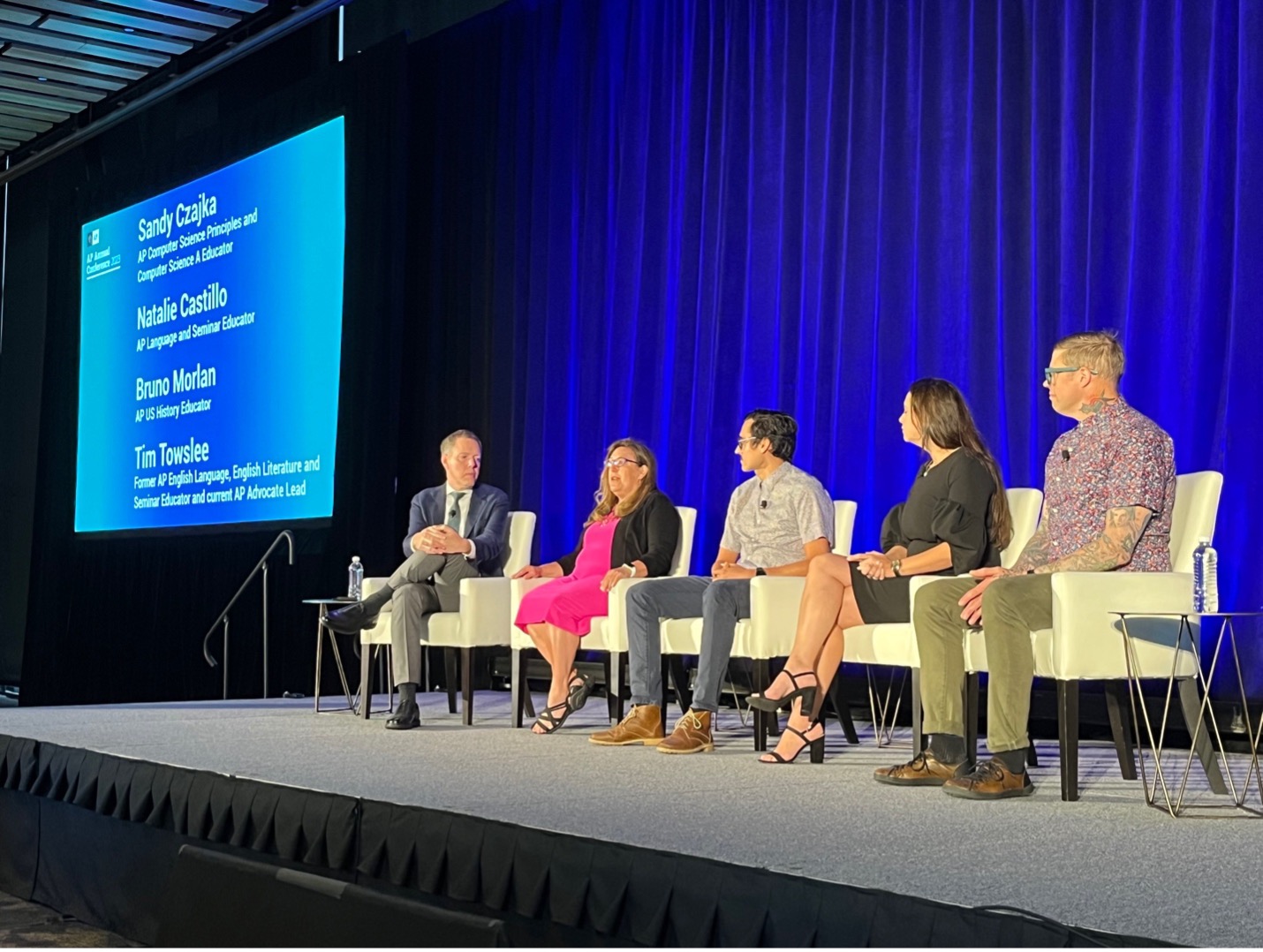AP Annual Conference 2023
The Role of Generative AI in the Classroom: A Conversation with AP Educators and Trevor Packer
Buzzing about the 2023 AP Annual Conference was the topic of generative AI. While the public at large wonders if artificial intelligence will take over the world, AP educators ponder and debate the merits of AI in their classrooms.
Trevor Packer, senior vice president of AP and Instruction at College Board, spoke with a panel of AP educators—Sandy Czajka, AP Computer Science Principles and Computer Science educator at Riverside Brookfield High School; Natalie Castillo, English teacher at Felix Varela Senior High School; Bruno Morlan, AP U.S. History educator; and Tim Towslee, former AP English Language, English Literature and Seminar Educator, current AP Advocate Lead—about their perspective on GenAI in education.
Educators Have Divided Opinions on AI
“Describe how you feel about AI in one word,” prompted Packer. The answers went down the line.
The reactions ranged from “enthusiastic” (Towslee) and “eager” (Czajka) to “open” (Morlan) to “skeptical” (Castillo).
Students Are Already Exploring GenAI and Need Guidance
Castillo recalled the feeling of being blindsided as AI crept into her classroom, where students were “using AI in nefarious ways.” To her dismay, a paper had been turned in that was obviously not written by the student.
She described the ownership that students can achieve from writing their own 2,000-word paper on a topic of their interest. While AI can be helpful as a study aid, she fears that a student’s reliance on AI could work to disempower them.
Similarly, Czajka recounted her surprise as computer science students submitted pieces of code that she would never have covered in class. However, she used this as a moment of reflective inquiry with her students, asking them “So, what did you learn from doing that?”
Czajka offered this insight, “[Students] already know that teachers don’t want them to cheat. But we have to educate students about what can go wrong [with AI].”
Students are becoming more and more curious about AI, and they’re discovering opportunities to try it. As a strong advocate for AI’s value, Morlan advises, “We [teachers] want to be the ones to teach students how to use AI.”
Morlan has already put this into practice. While using AI to generate images of historical women, the portrayals appeared more like Vogue models than real people. Upon seeing these results, it opened up a rich discussion in Morlan's class on the gender bias that exists in technology.
How AP Teachers Can Turn AI Pitfalls into Opportunities
Teachers have a reasonable fear that AI could do a student’s work for them. During the session, one teacher expressed concerns about AI’s ability to “spit out answers.”
But Towslee offered a refreshing take. While acknowledging AI’s swiftness to pull together responses, he ponders if there is an opportunity for teachers to “rethink assignments so that a robot can’t answer it.” Morlan added that AI enables us to teach students how to ask better questions and to find deeper questions.
Teachers can benefit from the use of AI behind the scenes, too. During an open mic portion of the session, Packer encouraged the audience of AP educators to share ways they have been using AI.
One teacher mentioned using the tool to generate a rough outline of a lesson plan. More often than not, the outline would be generic, but helped produce an initial start.
Another teacher used AI as a teaching assistant to grade free-response essays. To test the effectiveness of this approach, the teacher graded the student work on their own first and then asked AI to grade the responses. They found that the generated feedback was similar to their own human feedback.
Across the room, another educator gave their account of using AI to help her generate a letter of recommendation, in collaboration with the student. “I asked [the student] if I could experiment with using [AI] to write the letter. And [the student and I] were able to workshop this together.” This story of collaboration provided some hope to those in the room wondering if AI was erasing the sense of personal, human connection.
Final Thoughts
Packer’s final question to the panel was “What skills do students need that they can acquire from AI?”. The responses in this instance ranged from the specific (“checking sources” from Castillo) to the optimistic (“how to generate the best answers” from Towslee, and “the skill of inquiry” from Morlan) to the hopeful (“how to think on a deeper level” from Czajka).

